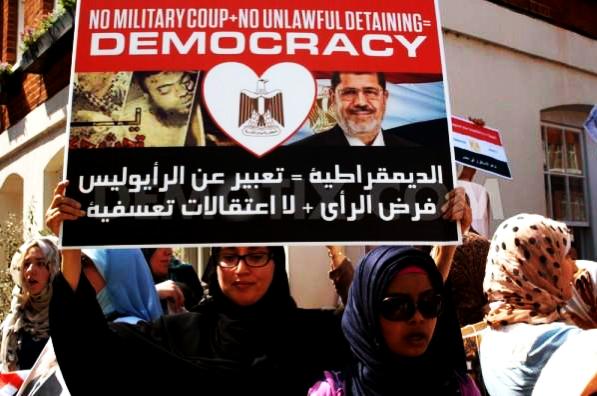Egypt Under Fascist Military Junta Rule

The fundamental shaper of human development in Egypt has been a military coup d'état waged on July 3, 2013 deposed the first elected civilian president in more than six decades, previously head of the freedom and justice party, the political arm of the Muslim Brotherhood (MB), appointed a civilian interim president until a new round of presidential elections can be held.
The military establishment (MLTE) at first declared it had no intention to rule the country. Within less than one year, however, with a host of bogus miracle solutions to the country's chronic problems advertised, the ex- Minister of Defence (MoD) ran for the post of president. Though turnout was low, he won a, clearly engineered, landslide, against just one other civilian candidate (who got less than the number of void votes).
The junta also suspended the constitution and advanced an agenda for political reform. A committee of 50 was appointed to rewrite the constitution, in a way that favoured the MLTE and placed it beyond the oversight by the people or their elected representatives.
The last element of reform was the election of a representative assembly, whose election was delayed repeatedly and finally was billed to take place in October-November 2015.
Before the results were announced, it was a hardly kept secret that not only the members of the parliament but even its speaker and heads of its committees had been already determined by the ruling president and his MLTE. The head of the coalition widely expected to win a majority, an ex- army- come military intelligence, general, had already announced that his list has no agenda except supporting the president and amending the constitution to expand his powers vis-a vis the parliament in the constitution re- written and adopted under military supervision and in favour of its supremacy in the state structure . Thus, military control has been extended to the legislative as well as the executive branch of the state. The military government will have no opposition in the parliament.
Since the coup, first through the puppet interim president and then after his election, the current president wasted no time issuing laws by executive decrees, usurping legislative authority, at the rate of at least one a day, cementing a police state and authoritarian rule with the MLTE capturing both polity and the economy, as an undisputed privileged societal stratum-clique. According to the current constitution, all hundreds of these decrees, are be ratified by the new parliament within two weeks only!
Even before he was elected president, the junta leader made it clear that he is diametrically opposed to the goals of the Jan. 2011 popular uprising of freedom, social justice and human dignity. Yet he was elected in the midst of an engineered frenzy of a staged media and advertisement campaign, complete with vulgar songs and dancing in the streets and at polling stations. It soon became evident that he intended to re-instate an even more vicious version of the corrupt authoritarian rule regime that the Jan. 2011 popular uprising aimed to topple.
Early in his reign, security forces disbanded two major sit-ins in greater Cairo by the supporters of the MB. The sit- ins had to be disbanded as they became public nuisances and eyesores, but the security forces used excessive force, the facts never became fully known but rumour has it that protesters using declared safe exits passageways were hunted by machine guns from helicopter gunships.
At the end of the day, the regime has committed its major crime against humanity, though the figures are disputed about one thousand participants are estimated to have been killed that fateful day: 14 August 2013.
But this was only the tip of a staggering iceberg of violations of human rights.



